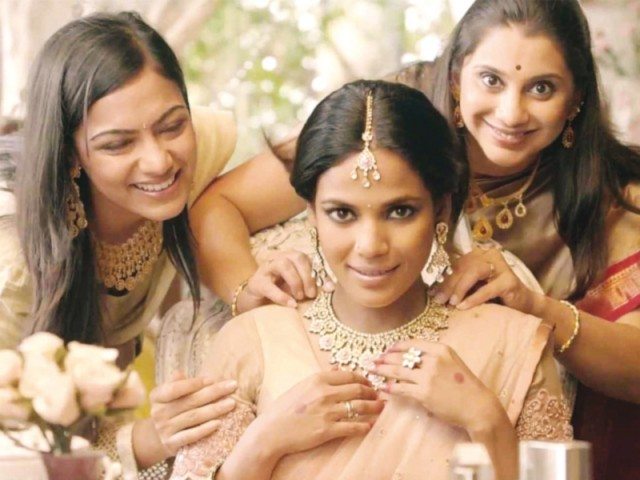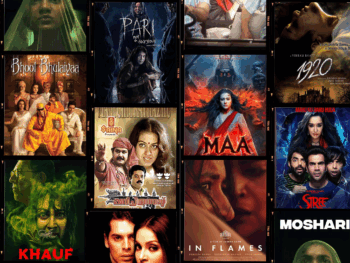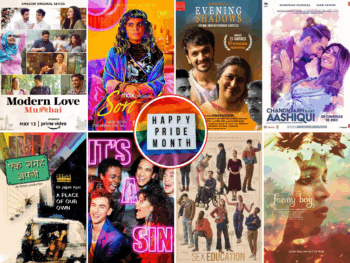Widow remarriage is a controversial topic in India. Popular culture has explored this topic many times with films like Indo-Canadian filmmaker, Deepa Mehta’s Water (2005) and Ravi Chopra’s Baabul (2006).
Well-known and popular jewelry brand name, Tanishq has made international headlines when it released a polemic advertisement that broke the traditional accepted norms in India. Directed by English Vinglish director, Gauri Shinde, the advertisement begins with a dusky bride (Priyanka Bose) who is getting ready for her marriage. Staring at the mirror, she opens the Tanishq jewelry box showcasing the intricate golden-pinkish ornaments, as she gets ready for the new milestone in her life. From the small corner of the room, a small innocent girl of five-six years glances over the woman.
Their relationship is unclear until the woman beckons the girl. The woman calls the beautiful young girl towards her and fixes her outfit. The mother and daughter then walk together towards the mandap. As the seven pheras around the fire begin, her daughter watches and wants to also participate in the ceremony. She quietly hushes her daughter to be quiet as the ceremony is taking place. Her new husband then calls the young girl and lifts her in his arms and proceeds to walk around the fire completing the ceremony.
Tanishq’s Facebook page 'about' section says “Tanishq understands the changing needs of a woman.” Indeed, the advertisement breaks the traditional norms highlighting many of India’s issues especially in lieu of women’s status in India that has sparked controversy all around the world and has accused India of being the "shame capital.” The advertisement addresses the controversial topic of widow remarriage and India’s standardization of beauty and what it means in the larger context of women’s rights in India.
In an interview with India Today, Shinde explained her choices to make an advertisement that would spark debates and controversy in India. Asked if the ad was created with a feminist agenda in her mind, she responded, “I was just reading a wonderful article in which the author discusses the dichotomies of our country: That women are being tortured as well as upheld as goddesses. I didn't think like that consciously. The fact is these dualities are India. This is what exists. And I am very conscious of these dichotomies when I work.”
As a post-colonial scholar who has worked on the status of women in India since my undergraduate career, I would suggest that this advertisement has indeed played an important role in breaking taboos such as widow remarriage that has been a problematic issue in India since the ancient times.
Historically, it was considered taboo for widows to get remarried especially because earlier on many Hindu wives practiced the ritual of sati compelled them to “jump into the fire” after their husband’s death. Similarly, during the partition, many women committed suicides by jumping into the well especially after their husbands were killed in riots in order to protect not only their honour but also the honour of their families and communities.
 Recently, India’s popular and independent filmmakers have become involved with making visual representations of films and advertisements that seek to break the traditional taboos about widow remarriage. Now, this advertisement does not only speak to the problematic issue of widow remarriage, but also seeks to address the obsession India has with fairness of the skin.
Recently, India’s popular and independent filmmakers have become involved with making visual representations of films and advertisements that seek to break the traditional taboos about widow remarriage. Now, this advertisement does not only speak to the problematic issue of widow remarriage, but also seeks to address the obsession India has with fairness of the skin.
Marriage biodatas and website profiles give options that describe a man or woman’s skin complexion – fair, wheatish, dark – are many of the options that prospective bride and groom are given to identify their skin complexion. People spend millions to achieve a “fair and lovely” beauty and bleach themselves to maintain the “whiteness” of their skin. The actress, Priyanka Bose, is described however as a “dusky” bride in the advertisement hinting towards the 'Dark is Beautiful' campaign started by none other than popular and talented actress, Nandita Das.
The 43-year-old actress was constantly questioned how she was so confident despite being dark. Her involvement in the movement immediately became an important turning point in the discussion.
She tells Tribune, “I started getting tonnes of emails from young women pouring their heart out about how they were discriminated against. Some wanted to commit suicide because they couldn’t be fair.” According to market researchers at Euromarket International, skin-lightening products have accounted for 84% of the country’s facial moisturizer market, according to their report.
The advertisement is indeed a mark of progress that still managed to provoke controversy but was received with admiration and many on twitter called it a 'brave attempt' on the part of the ad makers.
MP Naveen Jindal tweeted: A dusky bride with a daughter in an ad? Well done @TanishqJewelry for breaking stereotypes with grace & power #tanishq.
Shivangi Yadav also tweeted: So beautiful. Tanishq redeems itself with style while breaking a few norms.
Kudos to Tanishq for taking such a brave step to highlight such important issues that further enrich and compel us to rethink a woman’s status in a culturally-rich country like India!
Let us know your comments on the path-breaking ad.
Images & Sources: : tribune.co.pk, bollywoodlife.com, firstpost.com, indiatoday.intoday.in
Feature image: Tribune.co.pk
Youtube video: Tanishq Jewllery
Nidhi Shrivastava
Author
Nidhi Shrivastava (@shnidhi) is a Ph.D. candidate in the English department at Western University and works as an adjunct professor in at Sacred Heart University. She holds double masters in South Asian Studies and Women's Studies. Her research focuses on Hindi film cinema, censorship, the figure o...



















































































































